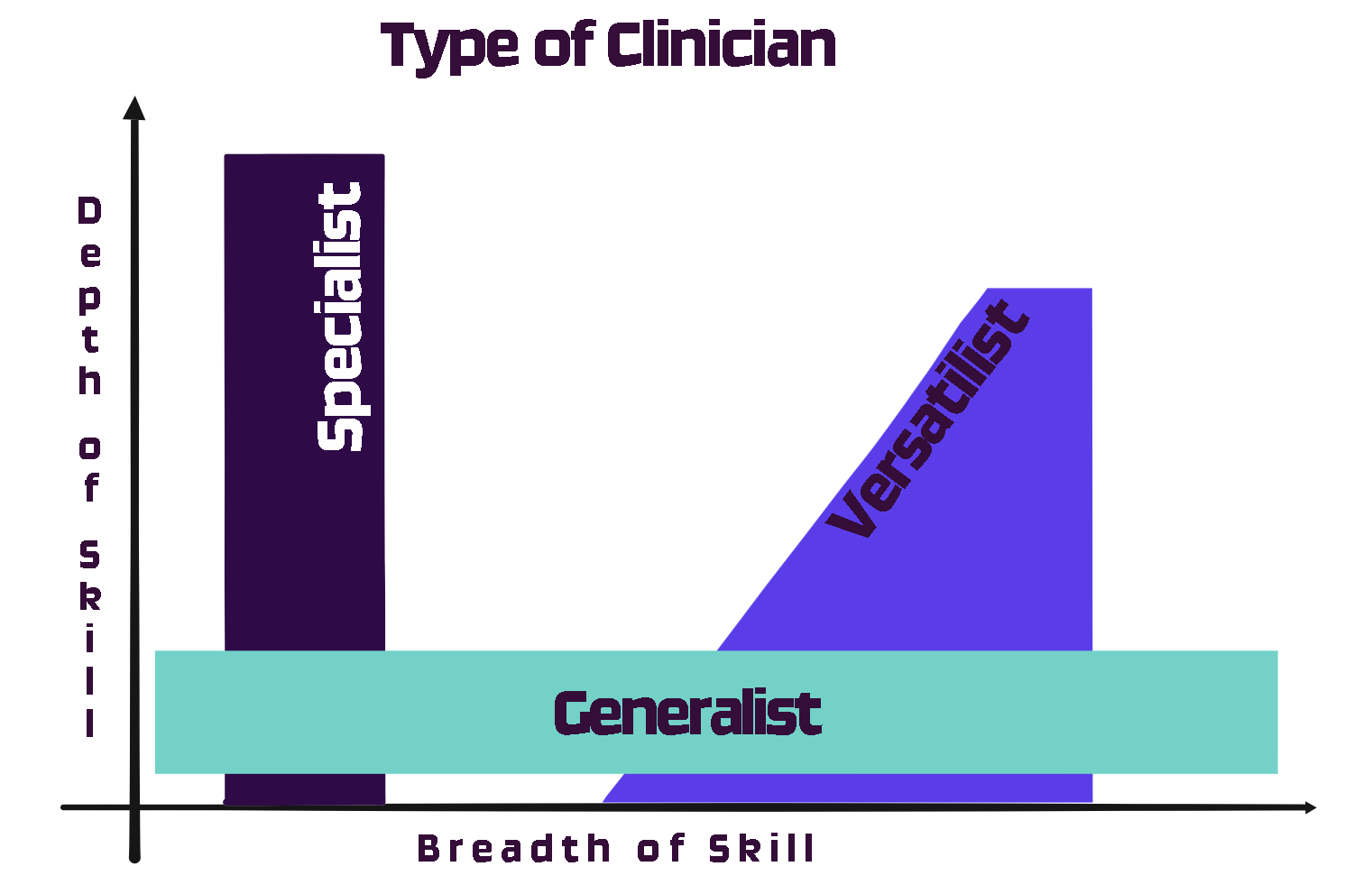Understanding that the role you do is more important than the job title is a surefire way to help you make career decisions.
There is often a tribal aspect to job titles which brings along unofficial hierarchy and unnecessary conflict between clinicians. It can cause confusion to people deciding which career path to take but also to patients. How can clinicians decide what a job title means for their career and patients decide which clinician they should see?
Moving Beyond The Specialist Moniker
Terms like ‘specialist’, ‘extended scope’, ‘highly specialist’ or even ‘very specialist’ cause confusion not only for colleagues within our profession but also outwardly too. When working on a ward how does the MDT know who to approach and when working in the community how does a colleague know who to discuss the patient with?
At the end of the day what do these titles actually mean apart from providing an opporunity to inflate ego or insert unhelpful and unclear hierarchy within teams. Aspirationally we all want the same thing, to help our patients get better and strengthen our health systems. Does it really matter what our badge says or do actions speak louder than badges?
The problem with titles and badges is that they don’t set expectations very well as titles don’t describe the level of practice we are working at. We can see this with the example of ‘specialist physiotherapist’. When someone is a specialist what does it mean in terms of their level of practice? It is more about saying they work in one area of practice rather than what is to be expected about their level of performance.
Furthermore, as there is a lack of consistency in regional and national training programmes job titles loose weight and therefore scope and abilities of clinicians are variable in different settings.
In argument for using job titles there is likely to be a sub-group of patients who respond well to titles. Some patients may value being reviewed by a ‘senior’ or ‘specialist’ member of the team and there may be an associated placebo effect. In reality title does not equate to years of clinical experience or clinical expertise. For example some clinicians have taken a more ‘junior’ role following a more senior one for work-life balance reasons etc.
Different Types of Clinician
Let’s break this title down a little more. Identity as a clinician is important to all of us but it isn’t something that should be used as a hierarchy or one-upmanship. No one clinician role is better than the other. Everyone has their own aspirations and some roles are more highly regarded and more sought after than others but that isn’t to say one is better than the other. Take a moment and think of someone in a role you see as aspirational, it probably isn’t the title that you are after, rather it is their knowledge and skills you want.
We can expand on this idea of the ‘specialist physiotherapist‘ title by looking at it from a role perspective, specifically the depth and breadth of skill required. We can also add in a couple of other roles for context too, generalist and versatilist. Each of these roles have novice, intermediate and expert levels and readjusts perspective of a role, not a title.

Role Specific Attributes
- Specialist – focused on a specific domain, with deep technical skills in a narrow field or activity. Often well known to peers within their speciality but unknown outside of it. An example is a clinician who’s clinic list is limited to a specific joint or condition.
- Generalist – broad scope of practice with an intermediate skill level which enables them to respond with agility and speed to different scenarios. Knowledge and competence is solid across the board. An example is someone who rotates between a wide range of different specialities / areas of practice.
- Versatilist – Broad and deep skill set with a wide scope and experience. Often known outside of their speciality. An example could be someone who has a role which requires some deeper understanding related to broad speciality or couple of specialities.
Each of these is a type of role not level of practice. Within each of these there are different levels of practice eg you can have a novice specialist or expert generalist. One is not better than the other! Certain jobs and specialities require you to adopt a different type of clinical role and hopefully this has helped clarify that for you.
Values > Title
The humble twitter poll often sheds light on situations. It turns out that people who responded to this poll much preferred a straight forward title. But what do you think?
AHP job titles are a funny thing aren't they. Can be confusing to colleagues and patients. What do they even really mean?
What would yould you rather be known as a…
other is an option… reply as a comment!#AHPs #physiotherapy @AHPsinBSW #OT #SLT #Dietitian #Podiatry
— Scott Buxton (@ScottBuxton_1) October 1, 2020
At the end of the day your personal beliefs as a clinician are the most important part of your professional identity.
 Personal values are broad goals that represent what is important to someone. Beliefs are thought constructs that people apply to themselves, others, the world or the future. Personal values and beliefs help to guide our behaviours and decisions we make. A person’s beliefs can be positive or negative and true or untrue. When analysing beliefs by their polarity and accuracy one can see where improvements can be made in their lives. This can be done by reframing untrue beliefs and recognising negative, true beliefs as an opportunity to change.
Personal values are broad goals that represent what is important to someone. Beliefs are thought constructs that people apply to themselves, others, the world or the future. Personal values and beliefs help to guide our behaviours and decisions we make. A person’s beliefs can be positive or negative and true or untrue. When analysing beliefs by their polarity and accuracy one can see where improvements can be made in their lives. This can be done by reframing untrue beliefs and recognising negative, true beliefs as an opportunity to change.